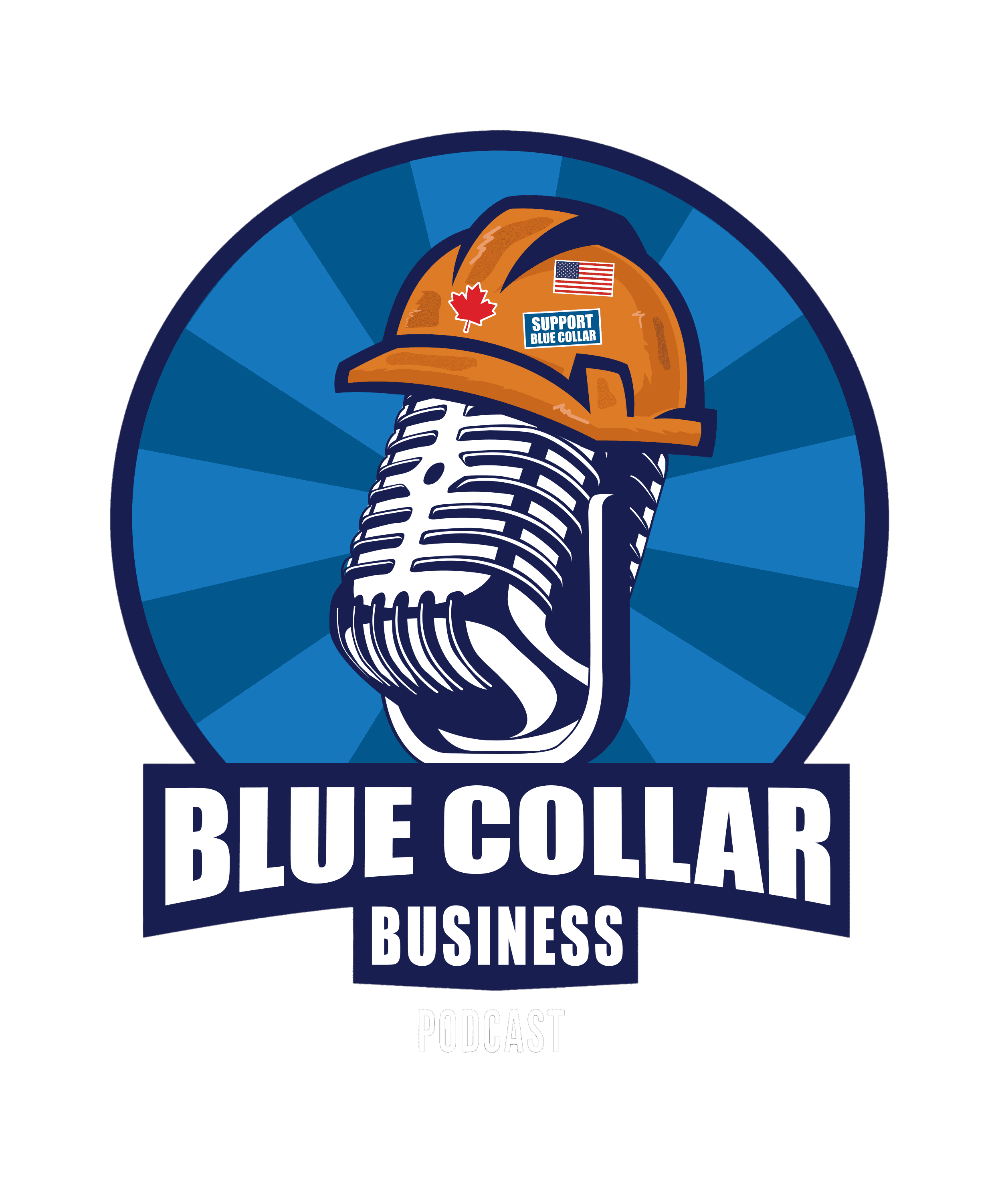What happens when a business owner with 22,500 TikTok followers who started pushing a mower across the street meets a podcast host who's been through the excavation industry's highest highs and lowest lows? Pure, unfiltered wisdom that every blue-collar contractor needs to hear.
Trent Harris of Blue Collar Contractors pulls back the curtain on his journey from mowing lawns as a freshman in high school to managing multiple commercial excavation sites with a growing fleet of equipment. His candid stories of working 70+ hour weeks while juggling a diesel shop and a young family will resonate with anyone who's built a business from nothing.
The conversation tackles the real challenges that excavation contractors face but rarely discuss publicly. From the cash flow nightmares of commercial work ("you're not seeing money for 90 days") to the psychological burden of making payroll while waiting on delayed payments ("there were tears shed"), Trent and Sy deliver actionable insights on navigating growth without imploding.
You'll discover why systems matter more than equipment, why documenting change orders is non-negotiable with general contractors who "know how to muddy the water," and why businesses often hit a ceiling around the $750K to $1M revenue mark. Perhaps most valuable is their discussion on building industry relationships through social media, which has transformed both their businesses in unexpected ways.
Whether you're pushing a mower, operating a mini-ex, or managing multiple crews, this episode delivers the unvarnished truth about scaling in the blue-collar world. As Trent says about getting through the toughest times: "You just keep going" - but this episode will equip you with far more than just persistence.
Ready to transform your business approach? Subscribe now and join the conversation that's helping contractors across the country build sustainable, profitable excavation companies.
Follow and stay connected:
Never miss an update—follow, subscribe, and join the conversation!
More About this Episode
Breaking Ground and Breaking Barriers: The Grit and Grind of Growing a Blue Collar Excavation Business
In the excavation world, where success often lies hidden beneath the dirt, there’s no handbook for how to make it. You learn by doing, by grinding, and by listening to the few voices willing to speak the truth. That’s what this conversation with Trent Harris from Blue Collar Contractors was all about - a raw, honest dive into what it really takes to build an excavation company from a lawn mower to a fleet of iron.
This isn’t a highlight reel. It’s the stuff you don't see on TikTok or on polished sales brochures - the long days, the sleepless nights, the money you didn't get paid, and the countless lessons you only learn by going through the fire. So, let’s dig in.
From Lawn Care to Heavy Iron: A Hustler’s Blueprint
Trent’s story doesn’t start in a boardroom. It starts with a push mower. In high school, he founded “Blue Collar Lawn Care,” mowing lawns in his neighborhood before he could even drive. By sheer hustle, that push mower turned into a zero-turn. Then came a skid steer, a tree service side hustle, a diesel shop, and eventually the full-blown excavation business we know today.
What sets Trent apart isn’t just the equipment - it’s the evolution of mindset. Like many in the trades, he started out doing whatever it took to survive. It wasn’t about strategy or systems; it was about making it to the next paycheck, putting groceries on the table, and keeping the lights on.
But survival mode only takes you so far.
Excavation Expansion: More Machines, More Problems
As the equipment list grew - Bobcat T66s, E60s, CAT 312s, dump trucks, trailers - so did the complications. With growth came new challenges: scheduling conflicts, equipment sitting idle, and jobs that didn’t go according to plan.
Trent talked candidly about one of the most painful realities: buying more equipment doesn’t solve your problems. It just changes them.
“You think buying a new $100K machine is the goal. Then you see it sitting in the yard for two weeks and realize it’s just another seat with no one to fill it.”
The truth is, organic growth without planning is dangerous. Every operator hits a point where hustle isn’t enough. You need systems. You need processes. You need strategy.
Commercial Work vs. Residential: A Whole New Beast
One of the most insightful parts of the episode was the contrast between residential and commercial excavation work. Trent broke it down:
- Residential is personal. It’s face-to-face. You know the customer. They know your name. It’s emotional, visual, and often based on trust and communication.
- Commercial is contractual. It’s technical. The work is bigger, the stakes are higher, and the payment cycles can be brutal—60, 90, even 120 days out.
Trent shared war stories of missed payments, vague change orders, and GCs who took advantage of his good nature. “If you don’t document every detail, they will eat you alive,” he said. And he’s right. In commercial, a handshake doesn't cut it. You need emails, signed change orders, and a backbone.
But commercial work also means growth. Bigger revenue. Bigger visibility. Bigger problems, yes - but also bigger potential.
Scaling Up: The $750K to $2M Jump (and the Cliff That Comes With It)
Both Sy Kirby and Trent nailed a key insight: that jump from $750K to $2M in annual revenue is a make-or-break point. Many operators stall out here. Why?
Because you can’t scale chaos.
You can grind your way to $500K or $750K, but beyond that, you need structure. Not just bigger jobs, but:
- Scheduling systems
- WIP (Work in Progress) reports
- Documented workflows
- Dedicated office support
Otherwise, you’ll grow revenue and shrink profit. You’ll double your stress without doubling your results.
Trent put it bluntly: “I doubled revenue and again - but in 2023, everything was out of control.” He had the work, but not the systems. His story is a warning and a guidepost for every contractor gunning for growth.
Marketing and Media: TikTok as a Growth Engine
This episode wasn’t just about dirt and diesel. Trent has built a real following on TikTok - 22,500 strong - and it's not fluff. His videos aren’t just for show; they’ve driven real relationships and even business opportunities.
Social media, especially in blue collar industries, is massively underutilized. While most operators stay heads down, the ones who win long-term are documenting, sharing, and connecting. That’s how Trent ended up at ConExpo. That’s how he formed a network of like-minded builders. That’s how this episode even happened.
So if you’ve been thinking about starting a TikTok, a podcast, or even just posting your work - stop thinking. Start doing. The world needs more authentic voices from the field.
Mental Battles: The Part No One Talks About
Of all the heavy machinery, tight bids, and payment headaches, the hardest part of building a business might just be mental.
Trent opened up about burnout, about crying in the yard with his wife, about questioning if it was all worth it. These aren’t moments of weakness - they’re the truth for every entrepreneur who’s put it all on the line.
“When I’ve had $40 in the account and haven’t bought groceries yet, I still have to ask—do I quit? Or do I just keep going?”
And that’s the heart of it. Success in the blue collar world doesn’t come from perfection. It comes from perseverance.
Keep showing up. Keep learning. Keep building.
Don’t Just Grow—Grow Right
If you’re a contractor in the field right now - maybe you’ve got one machine, maybe you’ve got ten - this episode is for you.
Yes, there’s money in this business. Yes, there’s freedom. But only if you build it right.
Don’t get caught up in revenue. Get caught up in profit. In people. In planning.
And if you’re feeling stuck, buried in the mud—mentally, financially, or emotionally—just remember what Trent said:
“You’ve survived this far. You’re not going to quit now.”
So don’t.
Put the next foot in front of the other. Start the next machine. Send the next invoice. Post the next video.
Because that’s what blue collar business is all about.



Member discussion: